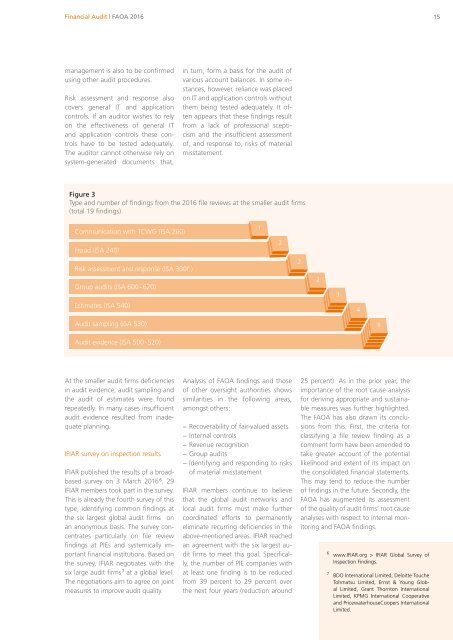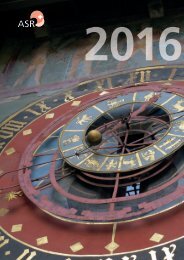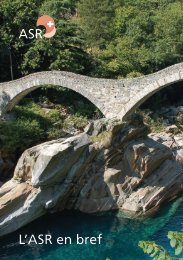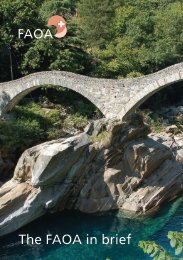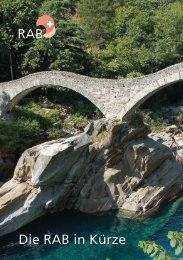Annual Report 2016
Annual Report 2016 - Federal Audit Oversight Authority FAOA
Annual Report 2016 - Federal Audit Oversight Authority FAOA
- No tags were found...
Create successful ePaper yourself
Turn your PDF publications into a flip-book with our unique Google optimized e-Paper software.
Financial Audit | FAOA <strong>2016</strong><br />
15<br />
management is also to be confirmed<br />
using other audit procedures.<br />
Risk assessment and response also<br />
covers general IT and application<br />
controls. If an auditor wishes to rely<br />
on the effectiveness of general IT<br />
and application controls these controls<br />
have to be tested adequately.<br />
The auditor cannot otherwise rely on<br />
system-generated documents that,<br />
in turn, form a basis for the audit of<br />
various account balances. In some instances,<br />
however, reliance was placed<br />
on IT and application controls without<br />
them being tested adequately. It often<br />
appears that these findings result<br />
from a lack of professional scepticism<br />
and the insufficient assessment<br />
of, and response to, risks of material<br />
misstatement.<br />
Figure 3<br />
Type and number of findings from the <strong>2016</strong> file reviews at the smaller audit firms<br />
(total 19 findings)<br />
Communication with TCWG (ISA 260)<br />
Fraud (ISA 240)<br />
Risk assessment and response (ISA 300f.)<br />
Group audits (ISA 600-620)<br />
Estimates (ISA 540)<br />
1<br />
2<br />
2<br />
2<br />
3<br />
4<br />
Audit sampling (ISA 530)<br />
5<br />
Audit evidence (ISA 500-520)<br />
At the smaller audit firms deficiencies<br />
in audit evidence, audit sampling and<br />
the audit of estimates were found<br />
repeatedly. In many cases insufficient<br />
audit evidence resulted from inadequate<br />
planning.<br />
IFIAR survey on inspection results<br />
IFIAR published the results of a broadbased<br />
survey on 3 March <strong>2016</strong> 6 . 29<br />
IFIAR members took part in the survey.<br />
This is already the fourth survey of this<br />
type, identifying common findings at<br />
the six largest global audit firms on<br />
an anonymous basis. The survey concentrates<br />
particularly on file review<br />
findings at PIEs and systemically important<br />
financial institutions. Based on<br />
the survey, IFIAR negotiates with the<br />
six large audit firms 7 at a global level.<br />
The negotiations aim to agree on joint<br />
measures to improve audit quality.<br />
Analysis of FAOA findings and those<br />
of other oversight authorities shows<br />
similarities in the following areas,<br />
amongst others:<br />
− Recoverability of fair-valued assets<br />
− Internal controls<br />
− Revenue recognition<br />
− Group audits<br />
− Identifying and responding to risks<br />
of material misstatement<br />
IFIAR members continue to believe<br />
that the global audit networks and<br />
local audit firms must make further<br />
coordinated efforts to permanently<br />
eliminate recurring deficiencies in the<br />
above-mentioned areas. IFIAR reached<br />
an agreement with the six largest audit<br />
firms to meet this goal. Specifically,<br />
the number of PIE companies with<br />
at least one finding is to be reduced<br />
from 39 percent to 29 percent over<br />
the next four years (reduction around<br />
25 percent). As in the prior year, the<br />
importance of the root cause analysis<br />
for deriving appropriate and sustainable<br />
measures was further highlighted.<br />
The FAOA has also drawn its conclusions<br />
from this. First, the criteria for<br />
classifying a file review finding as a<br />
comment form have been amended to<br />
take greater account of the potential<br />
likelihood and extent of its impact on<br />
the consolidated financial statements.<br />
This may tend to reduce the number<br />
of findings in the future. Secondly, the<br />
FAOA has augmented its assessment<br />
of the quality of audit firms’ root cause<br />
analyses with respect to internal monitoring<br />
and FAOA findings.<br />
6 www.IFIAR.org > IFIAR Global Survey of<br />
Inspection Findings.<br />
7 BDO International Limited, Deloitte Touche<br />
Tohmatsu Limited, Ernst & Young Global<br />
Limited, Grant Thornton International<br />
Limited, KPMG International Cooperative<br />
and PricewaterhouseCoopers International<br />
Limited.


